|
|
|
Sort Order |
|
|
|
Items / Page
|
|
|
|
|
|
|
| Srl | Item |
| 1 |
ID:
108149
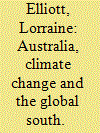

|
|
|
|
|
| Publication |
2011.
|
| Summary/Abstract |
Australia's climate change relationship with developing countries is framed by the 1992 United Nations Framework Convention on Climate Change and the 1997 Kyoto Protocol. Under those agreements, Australia has committed to take a lead in cutting greenhouse gas emissions and to provide technological and financial support to developing countries. In practice, Australian governments of both political hues have adopted a somewhat ambiguous and ambivalent attitude to developing countries within climate change politics and their fulfilment of those commitments has been uneven. This is particularly so if the concept of the 'Global South' is expanded from developing countries to include those people who are vulnerable to the environmental, social and economic impacts of climate change.
|
|
|
|
|
|
|
|
|
|
|
|
|
|
|
|
| 2 |
ID:
183507


|
|
|
|
|
| Summary/Abstract |
Australian IR scholars and scholarship have been prominent in framing, informing and contributing to global debates in the field of global environmental politics. This article reviews and analyses those contributions with a focus on the period since 2009. It takes as a starting point research that addresses international or global environmental issues, including those that demand a scalar approach to how the global is voiced and experienced at local and regional sites, and that, in doing so, illuminates key disciplinary concerns and contributes to disciplinary debates. The core of the article is woven around three overlapping sub-fields: global environmental governance, international political economy, and normative IR. It reveals how Australian-based IR scholars working on the environment have engaged with critiques of neo-liberalism, pursued more critical approaches to securitization, expanded the empirical and conceptual basis of how we understand institutional ecosystems, contributed to bringing social justice concerns to the forefront of global environmental politics and theory, and been part of a conversation about environmental challenges in the Asia Pacific region. The article concludes with some thoughts about the future direction of this research and scholarship.
|
|
|
|
|
|
|
|
|
|
|
|
|
|
|
|
| 3 |
ID:
052327
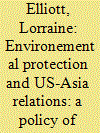

|
|
|
|
|
| Publication |
June 2004.
|
| Summary/Abstract |
Despite the post-September 11 focus on regional security and the continued emphasis on regional economic cooperation, environmental degradation should not be overlooked as an important issue for US policy in and relationship with the Asia-Pacific. It is an important issue in its own right, presenting the countries of the region with ecological, economic and social (human security) challenges. There are both ethical and instrumental impulses for the United States, as a rich industrialised country and as a disproportionate consumer of resources and polluter of global waste, to provide environmental assistance to the Asia-Pacific. Despite global demands that the 'new' new world (environmental) order should be based on solidarity and collective responsibility, neither US environmental policy towards the region nor the regional consequences of its international environmental policy more generally meet this test. The US is fundamentally self-regarding rather than other-regarding in the various dimensions of its environmental relationship with the region. The consequences for both the region and for the US may be substantial. Continued environmental degradation in the region has the potential to undermine other US policy goals, in terms of its reputation, it economic objectives and even its more orthodox geopolitical security objectives.
|
|
|
|
|
|
|
|
|
|
|
|
|
|
|
|
| 4 |
ID:
155098
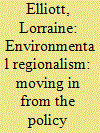

|
|
|
|
|
| Summary/Abstract |
In the last 30 years, environmental challenges in the Asia-Pacific have gone from sitting at the margins of political discourse to featuring prominently in academic and policy debates about institutional capacity, economic sustainability and regional futures. Those challenges are extensive: they include loss of biodiversity and species, land degradation and deforestation, water pollution and scarcity, drought, wildlife smuggling, ozone depletion, other forms of atmospheric pollution, and climate change. This article explores regional responses to environmental challenges through a global governance lens. It examines the ways in which vertical and intergovernmental arrangements have been supplemented by institutions and networks that reflect horizontal and transnational approaches. It reveals that this has been an uneven process, with coherence and fragmentation equally represented. In its focus on the two key subregions of Southeast Asia and Northeast Asia, it shows how environmental cooperation has been implicated in a crisis of regionalism and caught up in states’ efforts to demonstrate that governance can still be effective in the absence of binding multilateral agreements.
|
|
|
|
|
|
|
|
|
|
|
|
|
|
|
|
| 5 |
ID:
117960
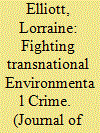

|
|
|
|
|
| Publication |
2012.
|
| Summary/Abstract |
Transnational environmental crime (TEC) is often not taken seriously within the broader policy and enforcement community. It is one of the fastest growing areas of cross-border criminal enterprise involving high profits and low risk for those involved in timber trafficking, wildlife smuggling, the black market in ozone-depleting substances, and the illegal trade in hazardous and toxic waste. TEC is increasingly characterized by commodity-specific smuggling networks, the intrusion of criminal groups involved in other forms of illegal trade and, in some cases, politically motivated organizations for whom this generates income to support other activities. But unlike other forms of transnational crime, there is no international treaty to prevent, suppress, and punish the kinds of trafficking and smuggling that constitute transnational environmental crime. The global regulatory and enforcement community has therefore developed innovative collaborative mechanisms to meet both the criminal and environmental challenges associated with this increasingly serious form of cross-border crime. Despite their successes, their efforts remain under-resourced. This article examines the challenges of TEC and efforts to respond to those challenges in the face of uncertain resources and limited awareness.
|
|
|
|
|
|
|
|
|
|
|
|
|
|
|
|
| 6 |
ID:
076911
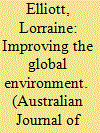

|
|
|
|
|
| Publication |
2007.
|
| Summary/Abstract |
Recent surveys in Australia show that improving the global environment rates high as a public policy concern. Responding to these challenges at a global level requires more than finding the best or most appropriate scientific, economic and technical approaches. It also requires that global environmental governance be based on sound normative principles. Two of the most important principles respond to the challenge that, while humanity is outstripping its ecological footprint, contributions to global environmental change are uneven and the experience of environmental harm is being displaced across time and space. Improving the global environment should therefore take into account the precautionary principle and the principle of common but differentiated responsibilities. Improving the global environment also requires a more robust institutional framework. The model favoured here is to build on UNEP to establish a more coherent, more authoritative and more independent environmental organization.
|
|
|
|
|
|
|
|
|
|
|
|
|
|
|
|
| 7 |
ID:
182836
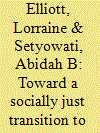

|
|
|
|
|
| Summary/Abstract |
In 2019, the Indonesian government released its post-Paris Agreement report Low Carbon Development: a paradigm shift towards a green economy in Indonesia, in which it set out an economic rationale for a move to low carbon growth. The core of the paradigm shift referenced in the report's title was that growth not only had to be decoupled from high carbon inputs but that in both practice and outcomes it had to be sustainable and inclusive. Yet the report does little to define social justice, equity practices, or inclusive outcomes in a green economy context. In this article, we foreground distributive, procedural and recognition aspects of social justice that are central to Indonesia's climate mitigation efforts and transition to a green, low carbon economy. We focus on two sectors that are key to this transition – forest and land-use, and energy. Our analysis shows that existing forms of injustice can exacerbate challenges for decarbonisation action and that low carbon transitions initiatives have been unable to overcome various forms of injustice and have, in some cases, created new injustices.
|
|
|
|
|
|
|
|
|
|
|
|
|
|
|
|
| 8 |
ID:
080572
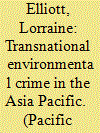

|
|
|
|
|
| Publication |
2007.
|
| Summary/Abstract |
While other forms of transnational crime in the Asia Pacific have been securitized - that is, represented by policy elites and security actors as crucial or existential threats to national and regional security - transnational environmental crime has been un(der)securitized. It warrants little mention in regional security statements or the security concerns of individual countries. Yet the consequences of activities such as illegal logging and timber smuggling, wildlife smuggling, the black market in ozone-depleting substances and dumping of other forms of hazardous wastes and chemical fit the (in)security profile applied to other forms of transnational crime. This article surveys the main forms of transnational environmental crime in the Asia Pacific and assesses the 'fit' with a 'crime as security' framework. It shows that transnational environmental crime generates the kinds of 'pernicious effects on regional stability and development, the maintenance of the rule of law and the welfare of the region's people' that the ASEAN Declaration on Transnational Crime identified as matters of serious concern. The analysis draws on securitization theory to understand the lack of a 'securitizing move' and to explain why security elites do not believe the problem warrants serious attention. The possibilities explored here include intellectual inertia, confusion about referent objects, institutional incapacity, mixed policy signals and the exclusion of environmental expertise from a closed community of security elites
|
|
|
|
|
|
|
|
|
|
|
|
|
|
|
|
| 9 |
ID:
165911
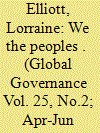

|
|
|
|
|
|
|
|